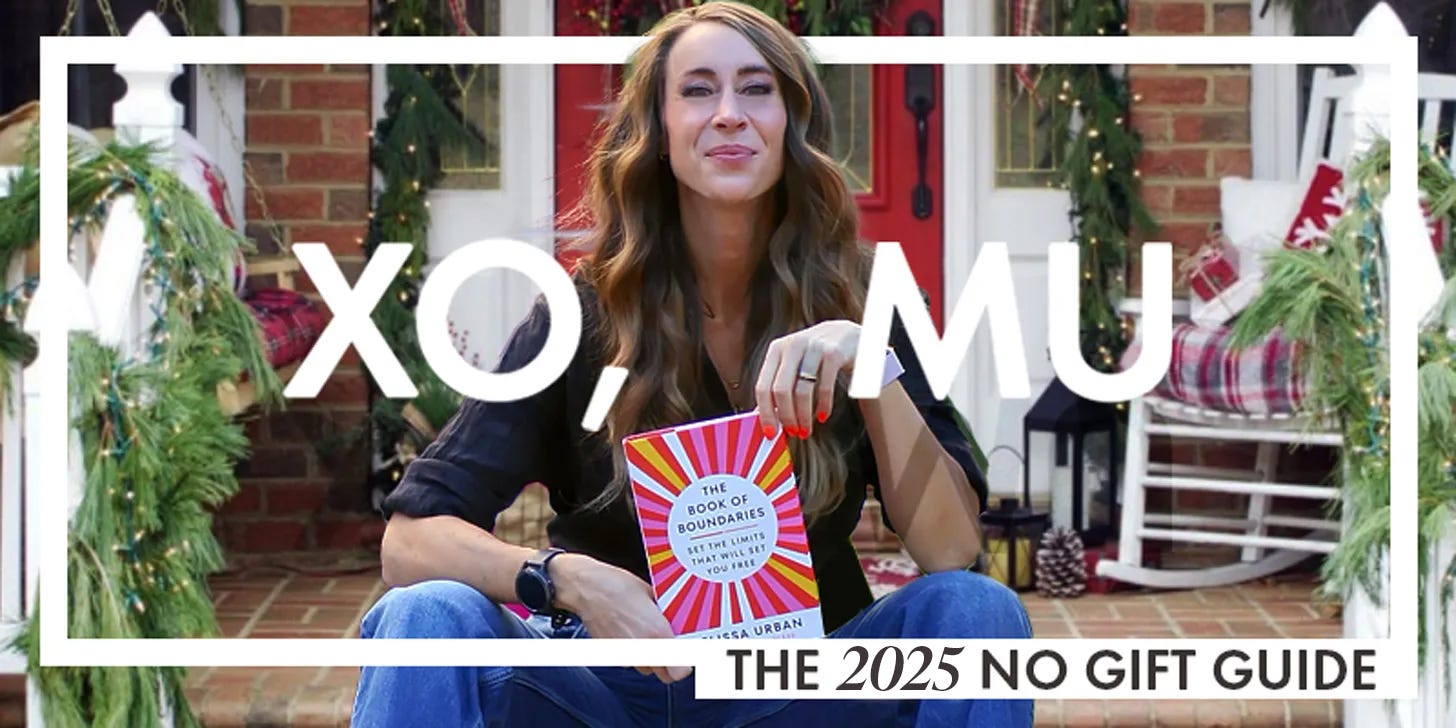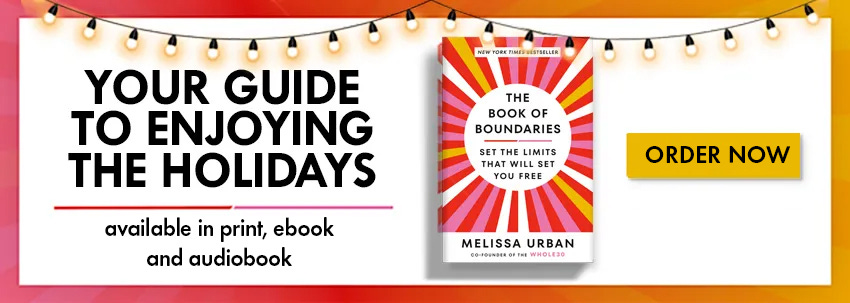The 2025 No Gift Guide: Bonus scripts
"I don't want to exchange any gifts this year, but how do I say it?" Scripts for every part of the "no gift" conversation—even the hard ones.
This issue is brought to you by The Book of Boundaries. Featuring more than 130 scripts for every occasion, The Book of Boundaries is your must-have field guide for navigating this holiday season. Available in paperback, ebook, and (read by me!) on Audible.
In the early 2000’s, I told my family, “I’m not exchanging Christmas gifts anymore.” (I said it a little more gracefully than that, but not much.) It’s proven the best decision I’ve ever made. I’m less stressed, less exhausted, and firmly grounded in being grateful for what I’ve already got. My family hasn’t pushed back at all, I send a card every year (it’s a beautiful card, I’m not a total Scrooge), and my mom donates to a charity in my name each Christmas as a gesture.
If this sounds intriguing, inviting, or you’re already like, “YES I WANT THIS,” watch my YouTube video. Then, skip below for bonus scripts for exactly what to say to set and hold this holiday boundary.
Bonus: No-gift boundary scripts
Now that you’ve had the initial conversation and dealt with any initial pushback, it’s time to hold the boundary. Here are some word-for-word scripts you can use in these scenarios, using my patented Green/Yellow/Red framework.
Green: Low risk, and the gentlest language. Assumes the other person wasn’t aware they were overstepping and wants to respect your limits. Your boundary language is clear, generous, and very kind.
Yellow: Elevated risk, and firmer language. Used as a follow-up if your Green boundary isn’t respected, or if historical interactions with this person indicate the threat is higher. Your boundary language is just as clear, but more firm.
Red: Severe risk, and your most direct language. This is the action you are going to take in the face of blatant boundary oversteps. This is the boundary itself, and is always within your control.
In each of these scenarios, start with the Green. If you continue to get pushback, escalate as needed.
Scenario: “I have to get you something, it will feel wrong if I don’t,” from someone struggling with the etiquette of not gifting, or if gifting is their love language.
GREEN response: “I understand. How about donating to the food bank in my name? That would be super meaningful to me.” (It’s a concession, but a small one—you’re still not getting a gift, and their money is going to good use. This is a win/win.)
YELLOW response: “I don’t want or need anything—spending time with you is all I want. How about you write me a special message in my Christmas card, and I’ll do the same? I’ll keep that longer than any scarf or candle.” (It’s a gentle redirection while holding firm on the “don’t buy me anything.”)
RED response: “My gift is having zero stress around giving or receiving presents. Trust me this year, I really don’t want anything.” (Red still isn’t very red, in truth—and that’s okay here.)
Scenario: “You don’t have to get me anything, but I’m still getting something for you,” said in a defiant tone.
GREEN response: “I’m specifically asking you to not get me anything. I know it feels weird, but it will mean a lot if you just go with it.”
YELLOW response: “It won’t feel like a gift to me, because I’ve asked you not to. I am now one less person on your shopping list.”
RED response: Don’t bring any gifts, and don’t accept any gifts. (More on this.)
Scenario: “But I already got you something.”
GREEN response: “That’s sweet of you, I’m sorry I’m sharing this with you after the fact. Can you save it for my birthday? I really want to leave gifts out of Christmas.”
YELLOW response: “Oh, thank you. Please give it to someone else, or donate it to the YMCA, they’re collecting gifts for families.” (They can also return it if they choose—that’s not your business at this point.)
RED response: There isn’t a red response here—but there might be if they still show up at Christmas with the gift they bought.
Scenario: “You’re ruining Christmas.”
GREEN response: “Actually, this makes me more excited for Christmas. Wait until I show up with my John Denver’s and the Muppets Christmas CD in my snowflake pajamas. I’m going to be the most festive one of the bunch.”
YELLOW response: “Oh wow, that’s intense. Christmas is about so much more than presents—you know that. Everybody else can gift as much as they want, I’m just opting out of that one small part of the holiday.”
RED response: “I’m stepping away from this conversation now. Just think about what I’ve said, and we’ll talk again when things feel less heated.” (Excuse yourself, hang up the phone, or end the text exchange.)
Scenario: You still get a gift on Christmas morning (but it’s the first year of “no gifts please”).
GREEN response: Assuming you had a clear conversation with the gift-giver, we’re past Green here, right? Still, assume they meant well. People struggle a lot with “don’t bring a gift” in a situation where gifting is an accepted practice or good etiquette. However, it’s gonna get awkward, so buckle up.
YELLOW response: “Oh, this is unexpected. We had that big conversation… let’s just see what Emma got next.” Redirect, then set it down next to you without opening it. Yes, this is a pretty bold statement, but if you open it and thank them, you’re abandoning your boundary (and yourself) just to make someone else more comfortable, and we don’t do that anymore. You can donate the gift, leave it with your host, or regift it yourself. What you choose to do with it is now your business.
RED response: The Yellow is functioning as the Red here. You didn’t accept the gift, but you didn’t hand it back to them either. It’s the first year; it will get better (or it won’t, and I’ve got strategies for that too).
Scenario: For the second year in a row, despite having the “no gift” conversation again and specifically emphasizing this with last year’s gift giver… you’re still getting gifts.
GREEN response: Uh, no. Not this year.
YELLOW response: Same.
RED response: “I’ve told you many times that I’m not exchanging gifts. Please do something else with this.” Then, hand the gift back to them or place it back under the tree. Yeah, they’ll be mad and you’ll probably be blamed, but at this point, who is the rude one here?
Repeat after me: A gift is not a gift if it’s unwanted. Now it’s a burden, requiring effort on your part. You have to do something with it—store it, find space for it, donate it, regift it—and the whole point of your boundary was that you would not be taking on unnecessary labor this year. We’re a few years in, this is not a gift, and you should not feel bad about not accepting it.
Your no-gift motivation
I’ve been sharing my no-gift strategies for years now. I recently asked my Instagram community how going “no-gift” has impacted their holiday season—and I could feel their relief and exhilaration through the screen:
“It’s SO much easier. I get to just focus on my time with family and traveling to see them with no extra financial stress.”
“I went no gifts with my siblings, and there is less stress. I’m looking forward to our family Christmas again!”
“So much easier to travel! No extra packing, shopping runs, or wrapping upon arrival!”
“No more stress! No more Black Friday shopping in crowds. FREEING!”
“I went no gifts years ago because of you. Took a while to get them on board but now my family really embraces the experiences over gifts philosophy!”
Going no-gift isn’t the right approach for everyone. The good news is that there are an infinite number of possibilities between “all the gift for everyone” and “no gifts for anyone.” Maybe your boundary needs to be about the kinds of gifts (no more cheap toys for the kids), or the number of gifts (I’m only buying for kids 12 and under), or the amount spent on gifts (let’s institute a $20 spending limit).
If you want to continue exchanging gifts this year but need to limit your practice to reduce stress, time, and expenditures, drop a comment and I’ll share more ideas.






There is no Christmas without John Denver and the Muppets. I said what I said. 💚
I’ve been gift free for a few years. Love it. Best decision ever. You really got me to that point a few years ago and I was surprised at how easily my family took it. An easy win, for once. 🎉
I love giving gifts when it is birthday or any other special occasion that we pick, just not the christmas craziness, that I do not love. It is always great to read these responses to remind myself how to be clear and kind this year as well. Thank you for this, Melissa!